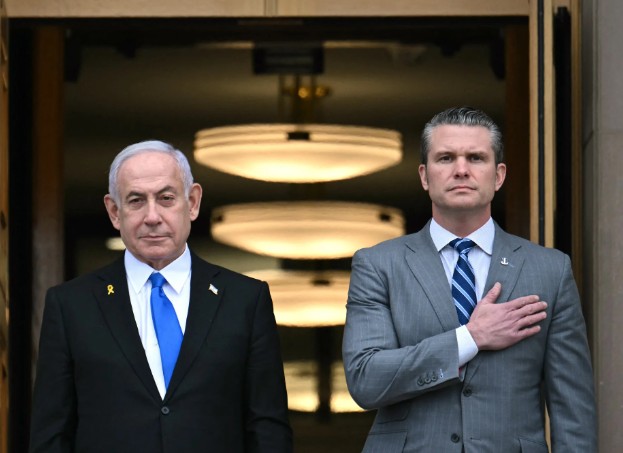U.S. Defense Secretary Pete Hegseth Welcomes Israeli Prime Minister Benjamin Netanyahu to Pentagon

U.S. Secretary of Defense Pete Hegseth welcomed Israeli Prime Minister Benjamin Netanyahu to the Pentagon on Thursday, marking a significant moment in the continued strengthening of U.S.-Israel defense relations. The visit comes at a time of heightened geopolitical tensions in the Middle East, with ongoing discussions around security cooperation and regional stability taking center stage.
The meeting between Hegseth and Netanyahu underscored the deep ties between the two nations, particularly in the realms of defense, intelligence sharing, and military strategy. In his remarks, Netanyahu reaffirmed Israel’s stance as a unique and critical ally of the United States in the region. He described the bond between the two countries as “unbreakable,” emphasizing the importance of continued collaboration in the face of evolving threats from adversarial states and non-state actors in the region.
“Israel and the United States share a common commitment to peace, stability, and security in the Middle East. The strategic partnership between our nations is one that ensures the safety and prosperity of both peoples,” Netanyahu said during the visit.
The timing of Netanyahu’s visit also comes amid renewed conversations about the future of Gaza, with U.S. President Donald Trump suggesting in recent comments that the U.S. could play a role in the region by taking over the governance of Gaza, a proposal that has sparked controversy and concern among various international stakeholders. While the idea has not gained traction, it adds to the ongoing debates over how to address the long-standing conflict between Israel and Palestine.
In light of these discussions, Netanyahu’s visit to Washington and the Pentagon carries extra weight. The Israeli Prime Minister’s meeting with Hegseth is seen as an opportunity for both leaders to reaffirm their shared commitment to Israel’s security, including the continued U.S. military aid to Israel and the expansion of defense technologies.
Hegseth, who took office as U.S. Defense Secretary earlier this year, highlighted the importance of the relationship between the U.S. and Israel, noting that both nations are facing similar threats in the region from Iran, Hezbollah, and other extremist groups. He also underscored the U.S. commitment to ensuring Israel’s qualitative military edge, an essential component of the U.S.-Israel defense agreement.
“The United States stands firmly with Israel, not just as a partner, but as a friend and ally. Our defense cooperation is vital to the security of both of our nations, and this meeting today reinforces that commitment,” Hegseth said.
While the two leaders discussed a wide range of security issues, including counterterrorism efforts and regional stability, the conversation also touched upon broader geopolitical dynamics, particularly with regard to Iran’s nuclear ambitions and the ongoing instability in Syria and Lebanon. The U.S. and Israel have shared interests in countering Iranian influence in the Middle East, and both countries have closely coordinated on military operations to curb Iran’s activities in the region.
Netanyahu’s visit also signals a continued alignment between Israel and the Trump administration, with both countries prioritizing mutual defense interests and countering threats posed by Iran and other adversaries. Netanyahu is expected to meet with Trump in the coming days, where further discussions on regional security and potential shifts in U.S. foreign policy in the Middle East are anticipated.
In addition to security matters, the two leaders are likely to discuss the evolving situation in Gaza, where tensions remain high between Israel and Palestinian groups. While the U.S. has historically supported Israel’s right to defend itself, the region’s volatile situation continues to generate global concern, with calls for renewed peace talks and a two-state solution.
As Netanyahu concludes his visit to the Pentagon, the discussions between the U.S. and Israel are expected to have far-reaching implications for future military cooperation, as well as the broader geopolitical landscape in the Middle East. The strategic partnership between the U.S. and Israel remains one of the cornerstones of U.S. foreign policy in the region, and both leaders appear committed to strengthening that bond in the face of growing regional challenges.
